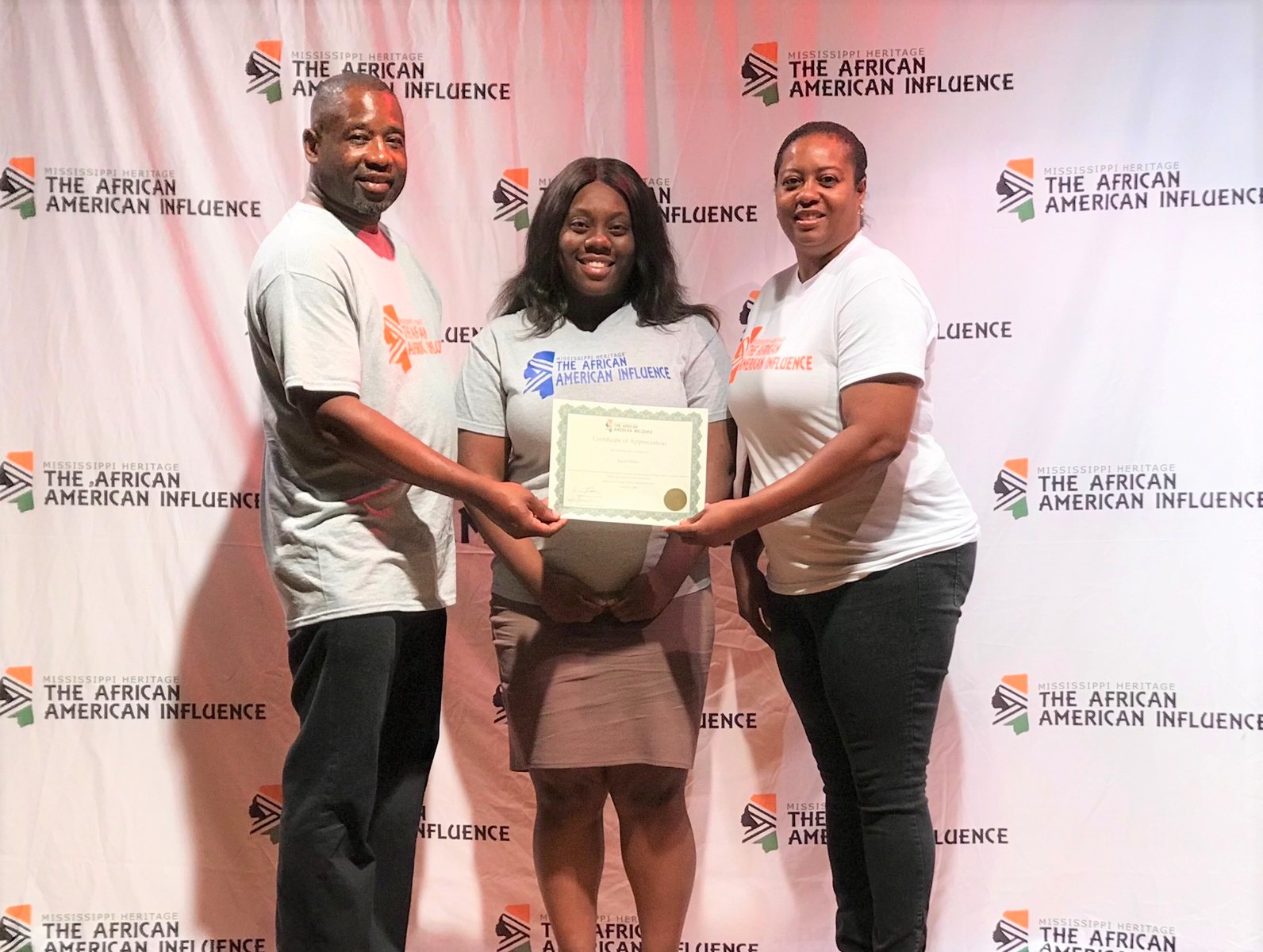 Delta State alumna Jayla Miller (center) poses with mobile app creative team members Hermon Cotton (left) and Dr. Teresa Moore at a recent app launch event in Jackson.
Delta State alumna Jayla Miller (center) poses with mobile app creative team members Hermon Cotton (left) and Dr. Teresa Moore at a recent app launch event in Jackson.
In spring 2019, The Delta Center and the McNair Research Scholars Program at Delta State University collaborated to provide an enriching cultural heritage education experience for a Delta State student.
Jayla Miller, now a Delta State alumna who was born and raised in the Mississippi Delta, dedicated the final semester of her senior year to interning with The Delta Center, where she researched Mississippi Delta African American cultural heritage landmarks. Her research was used to develop the Delta portion of the Mississippi Heritage-The African American Influence (MS Heritage AAI) mobile app.
The app is available on Google Play and the Apple App Store by searching “MS Heritage AAI.” It also is available at www.msheritageaai.com and webapp.mobileappco.org.
“Doing this research project with MS Heritage AAI mobile app and The Delta Center allowed me to see my generation’s connection to Mississippi Delta culture and history,” said Miller.
Her Delta Center internship was a requirement toward completing the McNair Research Scholars Program.
“We are so excited about Jayla’s accomplishments, especially this one,” said Wendolyn Stevens, McNair project director. “Jayla was extremely invested in making sure the stories were told and captured with as much authentic thought as possible. Her research internship is what our program strives for our Scholars to accomplish. Jayla’s contribution to this app will continue beyond her immediate reach.”
The mobile app was created by Mississippi Delta native Hermon Cotton. As reported recently by WJTV News, the app connects African Americans from Mississippi and their past and present contributions to Mississippi and the world through technology that is widely accessible.
“Everybody has a mobile phone. And it’s kind of our tool for information,” said Cotton. “My hope is to actually serve every individual with a positive and inspiring cultural influence by taking a look at the many facets of African American contributions here in Mississippi.”
Cotton continued, “Both Jayla and Delta State’s contributions to the Delta section of the MS Heritage AAI mobile app have been invaluable. This is an expression of Delta State’s commitment to preserving Mississippi Delta history and culture. We look forward to continuing this informative and inspiring relationship.”
The app features various Mississippi Delta African American cultural heritage sites, including the historic town of Mound Bayou, the B.B. King Museum and Delta Interpretive Center in Indianola, and the Cleveland-based Amzie Moore House Museum and Interpretive Center, which is managed by Delta State.
“We are thrilled to be included in the app,” said Malika Polk-Lee, executive director of the B.B. King Museum. “This is an excellent tool for educating Mississippi Delta residents and visitors about our living history and culture.”
“We help to create spaces and platforms for Mississippi Delta communities to tell their cultural heritage stories and take pride in historically significant places,” said Dr. Rolando Herts, director of The Delta Center and executive director of the Mississippi Delta National Heritage Area. “Whenever we can engage Mississippi Delta students and youth in that process as a learning opportunity, all the better. Preserving African American cultural heritage is a win for Delta State, the Mississippi Delta, and the nation.”
The mission of The Delta Center is to promote greater understanding of Mississippi Delta culture and history and its significance to the world through education, partnerships, and community engagement. The Delta Center serves as the management entity of the Mississippi Delta National Heritage Area and is the home of the International Delta Blues Project.
The Ronald E. McNair Post-Baccalaureate Achievement Program was established in memory of astronaut-physicist and Challenger crewmember, Ronald E. McNair. The program is administered through Delta State’s Office of Graduate and Continuing Studies. McNair is one of eight TRiO programs funded by the U.S. Department of Education. The goal of McNair Research Scholars to increase the attainment of Ph.D. degrees by students from underrepresented segments of society.

